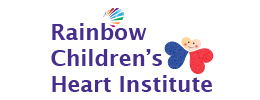There can be various causes of chest pain in children. Almost all structures in the chest, including the ribs, lungs, diaphragm, chest wall muscles, and the joints between the breastbone and ribs can cause pain in the chest. Infection irritation or injury to any of these can be the reason behind chest pain. Pain may also occasionally be referred from another area like the abdomen. It may even manifest from anxiety or stress. In children, it is rare for the heart to be the cause of chest pain. If that is the case, you may have to visit Rainbow Children’s Heart Institute, one of the best heart specialist hospitals in Hyderabad.
Conditions that commonly cause chest pain
Chest pain can be a of severe underlying disease. Thankfully, in most cases, it is only the self-limited or benign illnesses that cause the most chest pain. Some of the common conditions that are known to cause chest pain include:
- Costochondritis: It occurs when the joint between the ribs and the breastbone gets inflamed. It is more common among pre-adolescent and adolescent females, although anyone at any age can be affected by it. The condition may cause pain during exhalation or inhalation, but if breathing gets too difficult, it may be a cause for concern. The condition can be typically treated with a 1–2-week course of anti-inflammatory medications like ibuprofen.
- Injury: There can be many reasons why the bones and muscles of the chest wall might get injured. An obvious cause would be something like a direct blow to the chest due to a fall or during a sport. Other causes include frequent coughing, intensive aerobic exercise, or heavy lifting that might cause strain to the rib muscles. Treatment for such injury usually includes over-the-counter pain medications and rest. If the injury causes severe or persistent chest pain or if it also causes difficulty in breathing, you should consult a doctor.
- Anxiety or stress: You may find it hard to believe that stress can cause a symptom like chest pain. However, chest pain related to stress is not much different from stress-related headaches. Usually, the pain is non-specific or dull and tends to get worse with anxiety or stress. School examinations, loss of a relative, and various other factors can induce stress in children. If your child is already having chest pain, stress can make it even worse. That is why it is important to determine if anxiety is the result of chest pain or the cause of it.
- Precordial Catch Syndrome: It is a benign illness that does not have a known cause. It commonly occurs in adolescents and characteristically causes sudden onset of sharp and intense pain along the back or chest. The pain exclusively occurs during inhalation and a typical episode of the condition lasts for minutes and spontaneously resolves. Your child may experience several episodes every day. Deep inhalation might break the pain for a while. While the cause of the condition remains unknown, it does not cause any significant side effects. There isn’t any particular treatment for precordial catch syndrome and the frequency of episodes tends to reduce over adolescence.
- Acid reflux: This can cause pain in the stomach or chest. Your child might experience a burning sensation below the sternum, although he/she might not be able to describe the symptom accurately. The pain can vary depending on what and when your child eats. Acid reflux can be treated with over-the-counter and prescription medications.
Causes of cardiac chest pain in children
Chest pain caused by cardiac reasons is not very likely in children, unlike adults. Hence, the chances that your child might need pediatric heart surgery in India is rare. Following are the conditions that can cause chest pain in children, although you need to remember that they are rare:
- Pericarditis
- Abnormalities of the coronary artery
- Prolapse of the mitral valve
- Arterial Aneurysm
Other causes of chest pain
Apart from the ones mentioned above, there are other causes of chest pain that are relatively common. These include inappropriate accumulation of fluid or air, chest inflammation, asthma, and even lung infections. You need to be wary of other worrisome symptoms to see if your child needs to be evaluated promptly.
